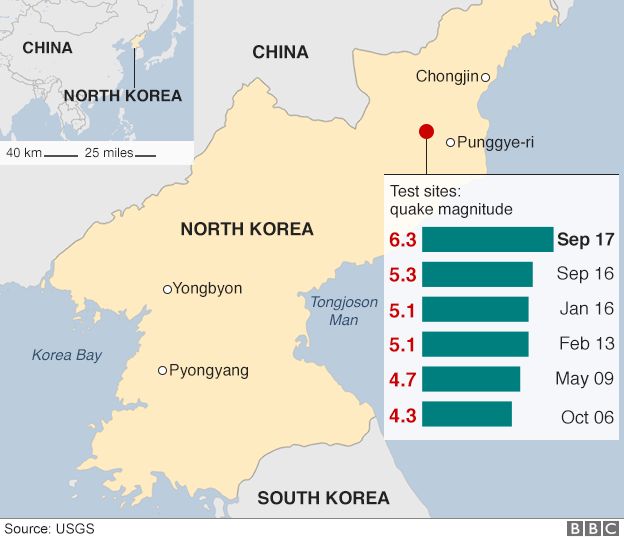North Korea nuclear test: Trump condemns ’hostile’ move
How can the world respond?
Jonathan Marcus, BBC defence and diplomatic correspondent
North Korea's sixth nuclear test - probably its largest so far - sends out one clear political signal.
Despite the bluster and threats from the Trump administration in Washington and near-universal condemnation from around the world, Pyongyang is not going to halt or constrain its nuclear activities.
Worryingly, it also suggests that this is a programme that is progressing on all fronts at a faster rate than many had expected. So far all efforts to pressure North Korea - sanctions, isolation and military threats - have all failed to move Pyongyang.
Could more be done? Certainly, but the harshest economic pressure would potentially cripple the regime and push it towards catastrophe - something China is unwilling to countenance.
Containment and deterrence will now come to the fore as the world adjusts its policy from seeking to roll-back Pyongyang's weapons programme to living with a nuclear-armed North Korea.
How did news of the test emerge?
The first suggestion that this was to be a far from normal Sunday in the region came when seismologists' equipment started picking up readings of an earth tremor in the area where North Korea has conducted nuclear tests before.
Initial reports from the US Geological Survey put the tremor at 5.6 magnitude with a depth of 10km (six miles) but this was later upgraded to 6.3 magnitude at 0km.
Then Japanese Foreign Minister Taro Kono said there was no doubt this was North Korea's sixth nuclear test.
Finally, in a radio broadcast that had been trailed as a "major announcement", North Korean state media confirmed this was no earthquake.
China embarrassed by ostracised ally
by Robin Brant, BBC News, Shanghai
North Korea's sixth nuclear weapons test is an utter rejection of all that its only ally has called for.
Beijing's response was predictable - condemnation, urging an end to provocation and dialogue. But it also spoke of urging North Korea to "face up to the firm will" of the international community to see denuclearisation on the Korean peninsula.
There is no sign, though, that China is willing yet to see that "firm will" go beyond UN sanctions, which recently clamped down on seafood and iron ore exports, in addition to the coal and minerals that are already banned from crossing the border.
It is noteworthy also that this test took place just as the Chinese president was about to welcome a handful of world leaders to the two-day showpiece Brics summit on China's east coast.
Even the state-controlled media will find it hard to ignore the fact that their man has been upstaged - embarrassed too - by its almost universally ostracised ally and neighbour.
Previous nuclear tests

tag: blog , information
Share This Post





